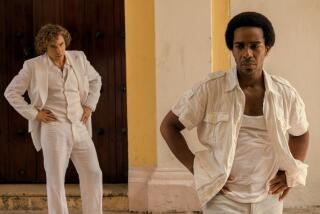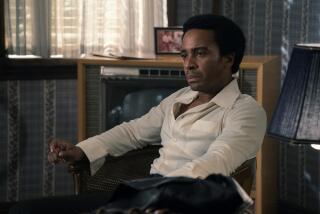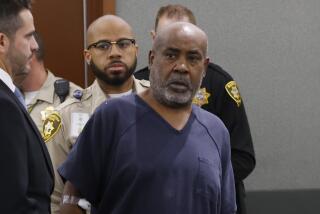Suspect Admits Killing Newton, Police Report
- Share via
OAKLAND — A man arrested Tuesday night during an unrelated traffic stop has admitted shooting Black Panther co-founder Huey P. Newton to death during an argument over cocaine, police said Friday night.
Investigators said Tyrone Robinson, 25, who has an extensive criminal record that includes a robbery conviction in 1985, killed Newton early Tuesday in an effort to advance his position in the Black Guerrilla Family, a narcotics distribution gang. According to police, Newton had “crossed” the gang several times in the past.
Robinson, Police Sgt. Dan Mercado said, “wanted to be a high-mucky-muck.”
“He was a foot soldier, and he wanted to be a shot caller. He figured we already knew. We felt we had him and he knew it,” Mercado said.
Detectives said Robinson told them that he shot Newton in self-defense when the two met by chance on the street. Robinson told detectives that Newton demanded free cocaine, and when Robinson refused, Newton threatened him with a gun.
However, police questioned several aspects of the story, saying there was no evidence that Newton had a gun at the time of the encounter.
Robinson said he and Newton had met earlier in the evening at a “crack” house where cocaine was being dispensed.
Mercado told reporters that the gun believed used to shoot Newton--a 9-millimeter pistol--has been recovered at the rear of a house “associated with Robinson.” Ballistics tests are scheduled to see if, in fact, the gun was used in the killing.
Robinson and two other ex-convicts--Mark White and Rodney Jackson--were stopped in Oakland on suspicion of running a red light about 14 hours after the murder. The stop was made near where Newton died.
Police said that after the stop, the three men “got cute” with the officers, who then discovered two guns in the vehicle. The three were booked on suspicion of being ex-convicts in possession of firearms.
Oakland Police Sgt. Mike Sitterud said Friday that there is “no indication at all” that White and Jackson, who were arraigned Friday on the gun-possession charges, were involved in Newton’s death.
Police said Robinson, an Oakland resident, admitted the killing prior to his scheduled arraignment Friday on the weapons charge, and the arraignment was postponed until Tuesday. As a result of his statement that he killed Newton, Robinson was rebooked Friday night on suspicion of murder.
Newton, 47, a leading and controversial figure in the Black Power movement of the 1960s, was shot in the head and left to die on an Oakland street corner near where he and Bobby Seale founded the Black Panther Party in 1966.
Two Views
While some, such as his attorney, Charles Garry, said they saw him as a leader in the fight for “humanity, equality of the races (and) the dignity of black Americans,” others, such as Alameda County Chief Assistant Dist. Atty. Tom Orloff, saw him simply as a criminal “who played no positive role in the community.”
Newton’s encounters with the law began in 1964, when he was convicted of felony assault with a knife.
He was convicted in 1968 of the murder of an Oakland police officer during a bloody gun battle that erupted in 1967 during a routine traffic stop. The conviction was later overturned, and a second trial ended with a hung jury.
He was accused of the 1974 murder of a prostitute, but the trial ended with a hung jury. Another 1974 charge involving the pistol-whipping of a tailor was dropped.
In 1982, Newton was accused of embezzling $600,000 from a Panther-run elementary school. He pleaded guilty earlier this year to stealing $15,000 in state aid to the school and was sentenced to six months in jail.
He had been sentenced earlier this year to 90 days in San Quentin Prison for possessing drug paraphernalia, which was a violation of his parole in an earlier case.
Several weapons charges over the years resulted in three convictions for which he served various amounts of jail time.
More to Read
Sign up for Essential California
The most important California stories and recommendations in your inbox every morning.
You may occasionally receive promotional content from the Los Angeles Times.













